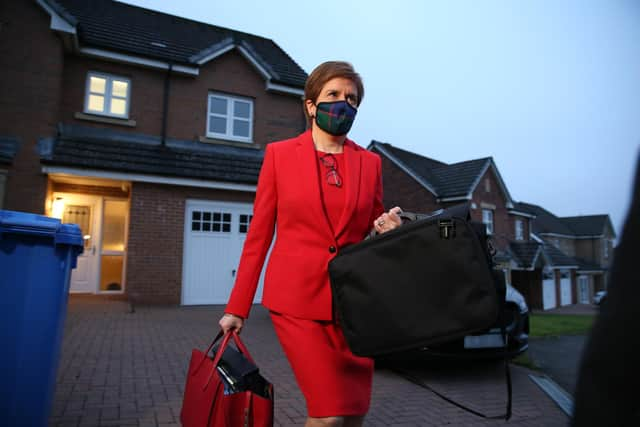Analysis: Salmond inquiry is damaging Scottish independence, but for how long?
On Wednesday, Scottish politics and Nicola Sturgeon had one of its longest days as she gave evidence to the Salmond inquiry.
The ongoing inquisition into the Scottish Government’s botched handling of harassment complaints against the former first minister Alex Salmond has been placed on a pedestal by the unionist opposition as the last great hope of knocking the First Minister off her high horse, while also praying support for independence would tumble as she does.
The truth of the matter is far more complex.


Advertisement
Hide AdAdvertisement
Hide AdNaturally the affair has impacted the SNP and Ms Sturgeon. Today’s new Savanta ComRes polls proves that, but it highlights the issue as deeply split on party lines.
Unsurprisingly , those who most like the Union flag are most likely to back Mr Salmond, while those who wish for independence back the woman most likely to achieve their dream.
In any second referendum, for Yes to have any hope of winning, it must turn some No voters on to their side and win the hearts and minds of those who did not or could not vote in 2014.
In these terms, the Salmond inquiry has hurt the cause.
One in five (22 per cent) of Yes voters in 2014 are more likely to vote No because of it, half of 2014 No voters also state the scandal entrenches their point of view, while more non-voters say the inquiry has pushed them towards No (26 per cent) than Yes (17 per cent).
The one silver lining in this for the SNP is that eventually the Salmond Inquiry will go away, be it through time or salvation for Ms Sturgeon.
Ahead of the Holyrood election, the SNP could even see its own version of the vaccine bounce being experienced by Boris Johnson, and will extol the virtues of its leader’s handling of Covid-19.
There is good reason to – 40 per cent of those who didn’t vote in 2014 say the vaccine rollout is turning them to independence, with 39 per cent stating the same for the handling of the pandemic.
Given every issue other than the Salmond inquiry is pushing more non-voters to Yes than to No, the question is how long will the SNP and Scottish independence continue to take the hit of what has undoubtedly been a damaging and avoidable fiasco.
A message from the Editor:
Thank you for reading this article. We're more reliant on your support than ever as the shift in consumer habits brought about by coronavirus impacts our advertisers.
If you haven't already, please consider supporting our trusted, fact-checked journalism by taking out a digital subscription.
Comments
Want to join the conversation? Please or to comment on this article.